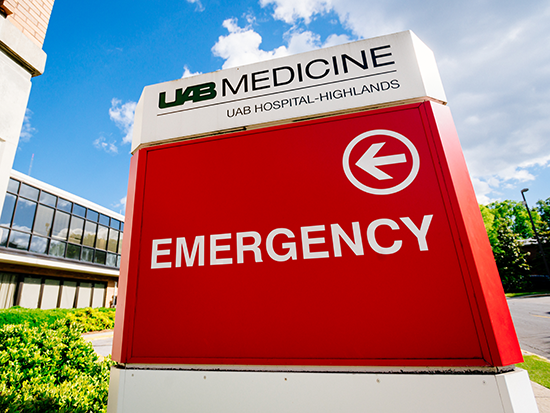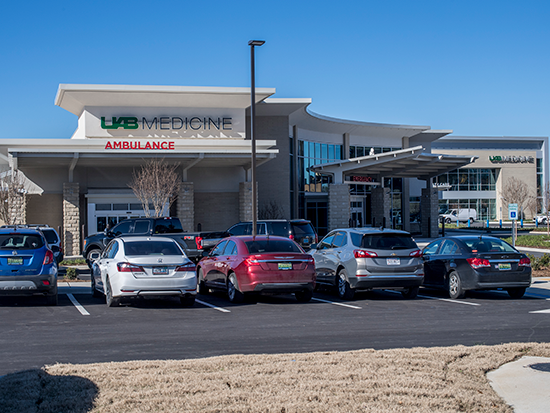 UAB Hospital-Highlands Emergency Department is staffed 24/7 by experienced board-certified UAB Emergency Medicine doctors, specialists and nurses, and it features the most advanced testing, monitoring and treatment technology available today.
UAB Hospital-Highlands Emergency Department is staffed 24/7 by experienced board-certified UAB Emergency Medicine doctors, specialists and nurses, and it features the most advanced testing, monitoring and treatment technology available today.
Photography: Andrea Mabry Emergency departments across the state are experiencing high occupancy with all-time-high numbers of patients waiting on beds in the hospital. This is part of a growing trend in health care following the height of the COVID pandemic. Determining the right place to receive care when someone is sick can be difficult. Primary care clinics, urgent care and emergency departments offer various resources to treat the sick and injured, all serving as a resource for different levels of illness.
“Knowing where to go to be treated for an injury or illness could help maximize emergency departments for true emergencies and get patients to other resources who can help them more quickly with minor illnesses,” said Marie-Carmelle Elie, M.D., endowed professor and chair of the University of Alabama at Birmingham Department of Emergency Medicine. “At UAB, we care about your health and want to be able to treat you as quickly and efficiently as possible. So, understanding the difference between clinics, urgent care and emergency departments could improve how you receive care and, importantly, how quickly you are seen.”
UAB physicians are available to treat patients at many different care sites across the region. Here is how patients can determine where to go and when.
What is an emergency department? When should I go?
UAB Medicine’s main emergency department is the only Level 1 trauma center in the state, providing care for the most complex cases. Some examples of complex cases include those that have experienced trauma in a car accident, fall or other significant event, someone experiencing a stroke or heart attack, or any other life-threatening situation that requires emergent medication or surgery.
“All of our patients need to be treated on an individual basis,” Elie said. “There is no cut and clear line of when you should or shouldn’t go to the emergency department. There are often many variables that go into deciding the best place for care.”
In addition to UAB’s main emergency department, there are several UAB locations in the Birmingham area that also provide a high level of emergency care with trained, board-certified emergency medicine physicians, including UAB Hospital-Highlands Emergency Department and the UAB Medicine freestanding emergency department of Gardendale. Eye care emergencies can be seen by specialists at UAB Callahan Eye Hospital. Here is a guide to illnesses and injuries that could be treated at these locations:
UAB Hospital-Highlands Emergency Department is staffed 24/7 by experienced board-certified UAB Emergency Medicine doctors, specialists and nurses, and it features the most advanced testing, monitoring and treatment technology available today. It is the first and only accredited Level 1 Geriatric Emergency Department in the southeastern United States. Location: 1201 11th Ave. South, Birmingham, AL 35205
UAB Medicine Freestanding Emergency Department of Gardendale UAB Medicine Freestanding Emergency Department of Gardendale is a state-of-the-art facility, for both adult and pediatric patients, and is equipped to handle most medical emergencies, including heart attack, stroke, trauma and much more.
UAB Medicine Freestanding Emergency Department of Gardendale is a state-of-the-art facility, for both adult and pediatric patients, and is equipped to handle most medical emergencies, including heart attack, stroke, trauma and much more.
Photography: Steve Wood is a state-of-the-art facility, for both adult and pediatric patients, and is equipped to handle most medical emergencies, including heart attack, stroke, trauma and much more. It is staffed by board-certified UAB Emergency Medicine physicians, advanced practice providers (such as nurse practitioners), registered nurses and other medical professionals trained in providing emergency care. It also houses a full-service pharmacy, on-site laboratory and complete diagnostic imaging services. Patient transfers to a hospital can be arranged if necessary, and the facility includes a helicopter landing pad for transporting patients with the most urgent medical needs. Location: 960 Rocket Way, Gardendale, AL 35071
UAB Callahan Eye Hospital Emergency Department serves as a comprehensive, fully dedicated eye emergency/trauma eepartment. It is the only 24/7 emergency department totally dedicated to eye emergencies and eye trauma in Alabama and one of only two in the nation. This emergency department offers emergency eye surgery and has specialty equipment and diagnostic testing for eye injuries. Location: 1720 University Blvd., Birmingham, AL 35233
“All UAB emergency departments are staffed by UAB physicians, and for some injuries and illnesses, one facility could have shorter wait times than the others,” Elie said. “Depending on the level of illness or injury and if immediate care is needed, we may encourage patients who call our ED Access Line to use one of our other emergency department locations.”
What is an urgent care clinic? When should I go?
Urgent care clinics offer convenient access to physicians and advance practice providers when care is needed quickly for non-life-threatening illnesses and injuries. Walk-in and appointments can be made seven days a week, with lab and X-ray services available on-site.
“If you experience an illness or injury that is not threatening your life, going to an urgent care clinic provides you top-level care without the long wait times,” Elie said. “Oftentimes those who come to the ED presenting a non-life-threatening illness or injury will wait longer to see a physician because of the more emergent patient needs. Utilizing urgent care could get you in and out of the clinic quicker with the same high-quality treatment expected from UAB.”
UAB Medicine Urgent Care treats those 18 years of age or older for non-emergency medical conditions, such as:
- Upper respiratory tract infections
- Urinary tract infections
- Headaches
- Cuts/abrasions
- Mild orthopedic injuries
- Hypertensive urgency
- Mild exacerbations of chronic conditions such as asthma, COPD and congestive heart failure
- Hyperglycemia
- Nausea/vomiting
Each patient’s diagnosis and treatment are tracked in UAB’s electronic medical record, which allows other UAB Medicine providers to be updated immediately regarding care. UAB Urgent Care is located at 125 20th St. South, Birmingham, AL 35233. Click here for hours.
UAB eMedicine provides access to the expertise of UAB clinicians from anywhere — 24/7. UAB eMedicine offers two types of online urgent care options to individuals 18 years and older for common conditions such as cold/flu, sinus infection, female bladder infection, pink eye, vaginal yeast infection, back pain, skin conditions, and more. There are two options for UAB eMedicine:
- The on-demand questionnaire takes about five minutes, and a diagnosis will be provided within an hour if the visit is submitted during normal eMedicine hours, Monday-Friday 8 a.m.-5 p.m., Saturday 8 a.m.-3 p.m. and Sunday 1-5 p.m. The cost is $25.
- The on-demand video visits allow a visit “face to face” with a trusted provider similar to an in-office visit. This option is available 24/7 and recommended if you think you have a more urgent common condition that may require a physical exam. The cost is $59.
What is a primary care physician? When should I go for illness or injury?
Many individuals turn to clinics, urgent care centers and emergency departments for their care; but these places should not replace a primary care provider. Clinics and urgent care centers are convenient, and often provide the care someone needs at that moment. However, a primary care physician can address illness and injury along with medical history to provide consistent care.
“UAB’s primary care providers are a great resource for non-life-threatening, non-urgent care and can serve as a patient’s first point of contact when an illness or injury that doesn’t need immediate attention arises,” Elie said. “We care about each patient and want you to be informed about your options for care at UAB. Utilizing your primary care physician for a non-urgent illness or injury could save someone else’s life.”
Having a relationship with your primary care provider can play a key role in the prevention of serious illness as well. Regular visits to receive vaccinations, check on one’s overall health and keep a consistent medical history could keep people out of the emergency departments.
UAB has primary clinics to serve patients across the Birmingham area, including UAB Medicine Gardendale, Hoover, Inverness and Leeds; UAB Family and Community Medicine at UAB Hospital-Highlands; The Whitaker Clinic of UAB Hospital; and UAB Pediatric Primary Care Clinic. To learn more about UAB Primary Care, visit uabmedicine.org.